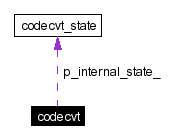 |
 |
|
Main Page | Modules | Namespace List | Class Hierarchy | Alphabetical List | Class List | File List | Namespace Members | Class Members | File Members | Related Pages | Examples
codecvt Class Reference | |||||||||||||||||||||||||||||||||||||||||||||||||||||||||||||||||||||||||||||||||||||||||||||||||||||||||||||||||||||||||||||||||||||||||||||||||||||||||||||||||||||||||||||||||||||||||||||||||||||||||||||||||||||||||||||||||||||||||||||||||||||||||||||||||||||||||||||||||||||||||||||||||||||||||||||||||||
Public Types | |
| typedef xchar_t | intern_type |
| typedef char | extern_type |
| typedef mbstate_t | state_type |
Public Member Functions | |
| codecvt (const::std::string &encoding_name, size_t refs=0) | |
| Contructor. | |
| void | delete_encoding () |
| Free the libiconv memory. | |
| void | create_encoding (const::std::string &encoding_name) |
| Allocate the libiconv memory. | |
| virtual | ~codecvt () |
| Destructor. | |
Protected Member Functions | |
| virtual result | do_out (state_type &state, const intern_type *from, const intern_type *from_end, const intern_type *&from_next, extern_type *to, extern_type *to_limit, extern_type *&to_next) const |
| Conversion internal layer to external layer. | |
| virtual result | do_in (state_type &state, const extern_type *from, const extern_type *from_end, const extern_type *&from_next, intern_type *to, intern_type *to_limit, intern_type *&to_next) const |
| Conversion external layer to internal layer. | |
| virtual result | do_unshift (state_type &state, extern_type *to, extern_type *to_limit, extern_type *&to_next) const |
| Put unshift character. | |
| virtual int | do_encoding () const throw () |
| Encoding test. | |
| virtual bool | do_always_noconv () const throw () |
| The protected virtual member function returns true only. | |
| virtual int | do_length (const state_type &state, const extern_type *from, const extern_type *end, size_t max) const |
| Number of external char needed to produce less than max internal char. | |
| virtual int | do_max_length () const throw () |
| Return the max length encoding. | |
Member Typedef Documentation
|
|
Definition at line 83 of file codecvt.hpp. Referenced by do_in(), do_length(), do_out(), and do_unshift(). |
|
|
Definition at line 82 of file codecvt.hpp. |
|
|
Definition at line 84 of file codecvt.hpp. Referenced by do_in(), do_length(), do_out(), and do_unshift(). |
Constructor & Destructor Documentation
|
||||||||||||
|
Contructor. The constructor initializes its locale::facet base object with locale::facet(refs). If refs==0, the lifetime is managed by the locale that contains this. If refs==1, the memory must be explcitly managed. the behavior for refs>1 is not defined. Definition at line 80 of file codecvt.cpp. References create_encoding(), and xchar_t. |
|
|
Destructor.
Definition at line 91 of file codecvt.cpp. References delete_encoding(). |
Member Function Documentation
|
|
Allocate the libiconv memory.
Definition at line 103 of file codecvt.cpp. References _(), codecvt_state::conv_in_out, codecvt_state::conv_out_in, xchar_t, XIMOL_ENCODERS_AS_ERROR, and XIMOL_ENCODERS_THROW. Referenced by codecvt(). |
|
|
Free the libiconv memory.
Definition at line 123 of file codecvt.cpp. References codecvt_state::conv_in_out, and codecvt_state::conv_out_in. Referenced by ~codecvt(). |
|
|
The protected virtual member function returns true only. If every call to do_in or do_out returns noconv. The template version always returns true. Definition at line 237 of file codecvt.cpp. |
|
|
Encoding test.
Definition at line 230 of file codecvt.cpp. |
|
||||||||||||||||||||||||||||||||
|
Conversion external layer to internal layer. The protected virtual member function endeavors to convert the source sequence at [from, from_end) to a destination sequence that it stores within [to, to_limit). It always stores in from_next a pointer to the first unconverted element in the source sequence, and it always stores in to_next a pointer to the first unaltered element in the destination sequence. state must represent the initial conversion state at the beginning of a new source sequence. The function alters its stored value, as needed, to reflect the current state of a successful conversion. Its stored value is otherwise unspecified. The template version always returns noconv.
Definition at line 175 of file codecvt.cpp. References codecvt_state::conv_out_in, extern_type, intern_type, and state_type. |
|
||||||||||||||||||||
|
Number of external char needed to produce less than max internal char. The protected virtual member function effectively calls do_in(mystate, from, end, next1, buf, buf + max, next2) for mystate a copy of state, some buffer buf, and pointers next1 and next2. It then returns next2 - buf. (Thus, it counts the maximum number of conversions, not greater than max, defined by the source sequence at [from, end).) The template version always returns the lesser of last1 - first1 and len2. Definition at line 244 of file codecvt.cpp. References extern_type, state_type, and XIMOL_MIN. |
|
|
Return the max length encoding. The protected virtual member function returns the largest permissible value that can be returned by do_length(first1, last1, 1), for arbitrary valid values of first1 and last1. The template version always returns 1. Definition at line 254 of file codecvt.cpp. |
|
||||||||||||||||||||||||||||||||
|
Conversion internal layer to external layer. The protected virtual member function endeavors to convert the source sequence at [from, from_end) to a destination sequence that it stores within [to, to_limit). It always stores in from_next a pointer to the first unconverted element in the source sequence, and it always stores in to_next a pointer to the first unaltered element in the destination sequence. state must represent the initial conversion state at the beginning of a new source sequence. The function alters its stored value, as needed, to reflect the current state of a successful conversion. Its stored value is otherwise unspecified. The template version always returns noconv.
Definition at line 131 of file codecvt.cpp. References codecvt_state::conv_in_out, extern_type, intern_type, and state_type. |
|
||||||||||||||||||||
|
Put unshift character. The protected virtual member function endeavors to convert the source element intern_type(0) to a destination sequence that it stores within [to, to_limit), except for the terminating element extern_type(0). It always stores in to_next a pointer to the first unaltered element in the destination sequence. state must represent the initial conversion state at the beginning of a new source sequence. The function alters its stored value, as needed, to reflect the current state of a successful conversion. Typically, converting the source element intern_type(0) leaves the current state in the initial conversion state. The template version always returns noconv.
Definition at line 219 of file codecvt.cpp. References extern_type, and state_type. |
The documentation for this class was generated from the following files:
- ximol/codecvt.hpp
- ximol/codecvt.cpp
